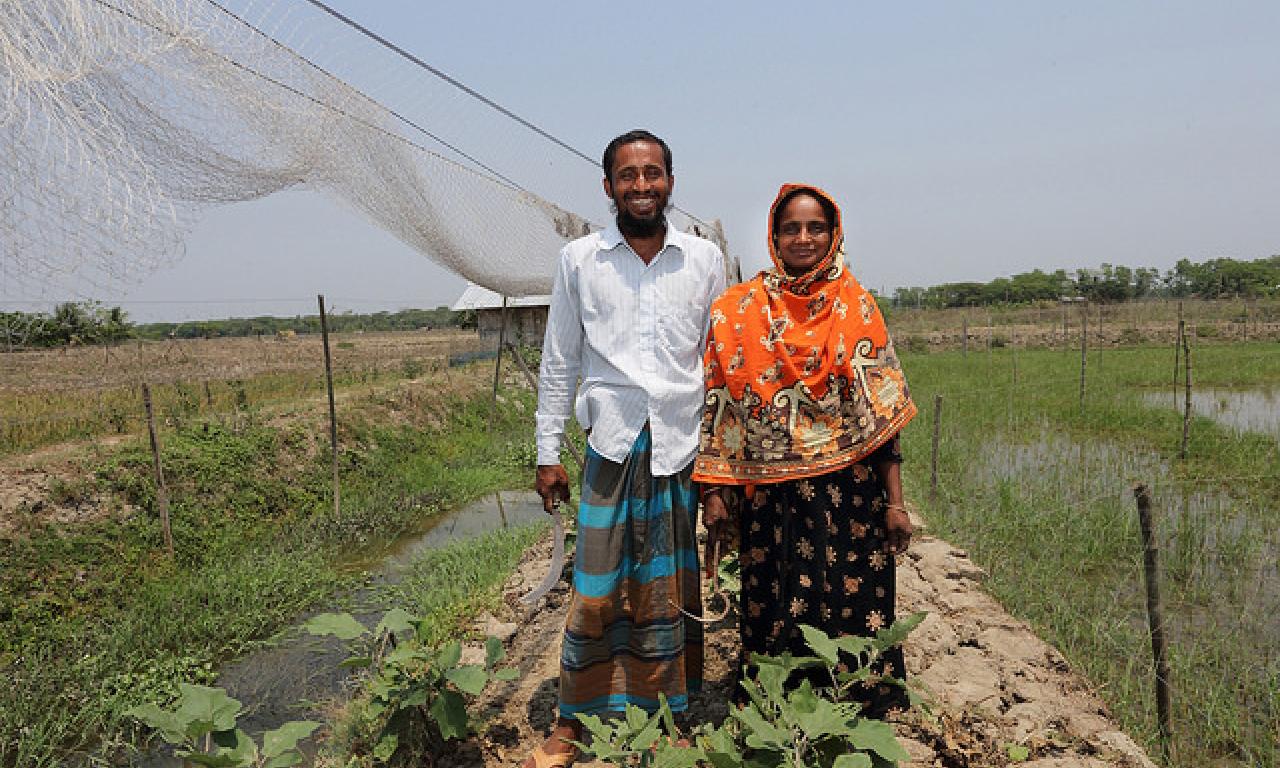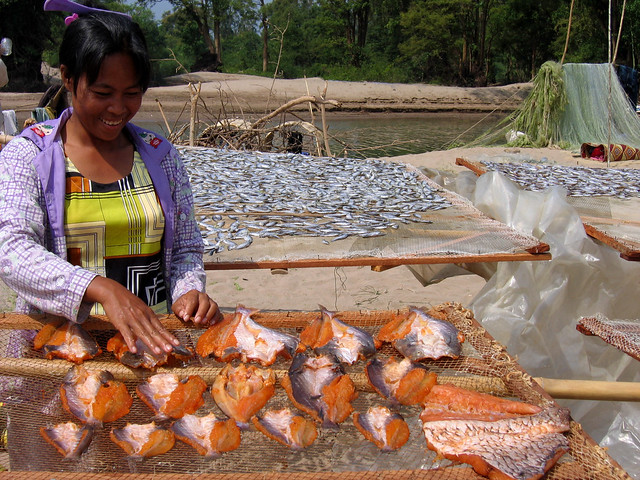
WorldFish gender scientists and partners are heading down under for the world-class Seeds of Change conference on 2–4 April 2019 in Canberra, where they will be collaboratively leading or taking part in a combination of 12 panels, workshops and presentations.
Recommended publications
- Gender-integrated research for development in Pacific coastal fisheries
- Promoting gender-transformative change with men and boys: A Manual to spark critical reflection on harmful gender norms with men and boys in Aquatic Agricultural Systems
- Gender norms and agricultural innovation: Insights from six villages in Bangladesh
Globally, women make up half the workforce in fisheries and aquaculture yet face greater barriers and receive fewer benefits than men.
WorldFish is committed to closing this gender gap through cutting-edge and reliable research on gender dynamics and factors that create and perpetuate gender barriers as well as innovations and strategies that address gender imbalances and contribute to women’s empowerment.
Learnings from this research, which is being undertaken as part of the CGIAR Research Program on Fish Agri-Food Systems (FISH), will be shared at the Seeds of Change conference on 2–4 April 2019 in Canberra, Australia.
The WorldFish team and partners will be actively contributing to this world-class event, hosted by ACIAR, the CGIAR Collaborative Platform for Gender Research and the University of Canberra, collaboratively leading or taking part in a combination of 12 panels, workshops and presentations.
Among the first of these is a practice workshop on Tuesday 2 April at 1.15 pm, during which Dr. Cynthia McDougall, Gender Research Leader, WorldFish, along with colleagues and partners from Helen Keller International, GENNOVATE and the CGIAR Collaborative Platform for Gender Research will be sharing ‘big ideas’ as well as tested gender-transformative strategies that aim to shift underlying gender barriers, such as norms that limit women’s mobility.
Sparking gender-transformative change
“The gender-transformative approach aims to spark women and men to critically self-reflect about the gender dynamics and norms in which they (we) live our lives and how these influence well-being,” says Dr. McDougall.
“We have observed that this awareness leads to shifts in norms and dynamics that perpetuate and reproduce inequalities. This is about individuals, households and groups themselves deciding what works for them together to drive this change process and create enduring positive outcomes.”
WorldFish has been pioneering the gender-transformative approach in fisheries and aquaculture since 2012, developing and testing a range of strategies and tools. These include facilitated sessions within savings and lending programming to increase financial resilience and promote shared household decision-making, and drama skits combined with context-appropriate postharvest technologies to reduce losses and women’s time burdens as well as expand women’s livelihood choices.
“The workshop objective is that participants will walk away with an understanding of how gender-transformative approaches are informed, designed and implemented on the ground,” adds Ramona Ridolfi, Regional Gender Advisor at Helen Keller International, who is co-presenting and has collaborated with WorldFish on gender-transformative work in Bangladesh and Cambodia.
WorldFish continues to test the gender-transformative approach in new contexts as more donors and development organizations become interested in it and its potential to contribute to the Sustainable Development Goals, particularly SDG 5 (Gender equality).
“Critically, the approach includes enabling men to become aware of and question how gender dynamics, particularly ‘harmful masculinities’, may affect men themselves,” says Dr. Steve Cole, Gender Scientist, WorldFish.
Harmful masculinities and how these are shifted by the gender-transformative approach will be discussed at a plenary panel on Wednesday 3 April at 1.30 pm. Co-organized by WorldFish, the CGIAR Collaborative Platform for Gender Research and the International Food Policy Research Institute, the panel will feature ‘men champions of gender equality’, including Dr. Cole and WorldFish colleague Surendran Rajaratnam.
Informing practice
The Voluntary Guidelines for Securing Sustainable Small-Scale Fisheries—the first international instrument for the sector, endorsed in 2014—calls for concerted efforts to recognize the role of women, achieve gender equality and challenge discriminatory practices.
“This requires national fisheries agencies to have the capacity and capability to incorporate gender research and best practices in their practice and policy,” says Dr. Danika Kleiber, a research fellow working with WorldFish and James Cook University.
Exploring these required capacities and capabilities will be the focus of her presentation ‘Gender integration in small-scale fisheries—The challenge of integration at scale’ on Thursday 4 April at 1.30 pm.
“Building off the excellent work by Sarah Lawless and Dr. Sangeeta Mangubhai, we are developing a research tool for assessing national fisheries agencies for their ability and willingness to integrate gender research and gender equity practices into their institution. The examination of national institutions can help identify key barriers and opportunities for the implementation of the Voluntary Guidelines.”
Kleiber will discuss this same topic at an upcoming webinar on 16–17 April co-hosted by WorldFish, Gender in Aquaculture and Fisheries Section and Too Big To Ignore, a global partnership for small-scale fisheries research.
“In the webinar we will refine survey questions that will help us understand key issues of capacity and capability such as the presence of gender equity in fisheries policy, the practice of sex-disaggregated data collection, and the attitudes of staff towards gender,” Kleiber says.
Integrating gender in agri-food systems research
Research into agri-food systems is growing. Yet historically, efforts to integrate gender have focused mainly on the production sector and as such have not been able to capture the complexities, trade-offs and dependencies that exist along value chains or within agri-food systems.
Addressing the effective integration of gender into research in this emerging area is a key conference theme, which is led by Dr. McDougall and Dr. Ranjitha Puskur, Theme Leader, International Rice and Research Institute.
WorldFish, too, is tackling this issue in its work by developing gender integration guidelines and coaching trajectories in FISH. KIT: Royal Tropical Institute has been a key partner in these.
“It has been great to work with technical scientists and partners of WorldFish and FISH and see them get to grips with the issues and why gender matters for their work,” says Dr. Julie Newton, Gender Geographer, KIT.
“There were some important ‘lightbulb’ moments during our workshops. We have taken this on board to make the guidelines practical and user-friendly.”
Dr. Newton will present on the guidelines’ progress in ‘Integrating gender in agri-food systems research: Principles, pitfalls and ways forward’ on Wednesday 3 April at 11 am.
Closing out the conference on Thursday 4 April at 3.30 pm is a ‘provocations’ plenary panel during which Dr. McDougall alongside Professor Naila Kabeer from the London School of Economics, keynote speakers and the other theme leaders, will reflect back on the event and the challenges ahead.
For those who cannot attend the conference, watch the livestream of selected highlights on the ACIAR YouTube channel or join the conversation on Twitter at #SeedsOfChange2019.


